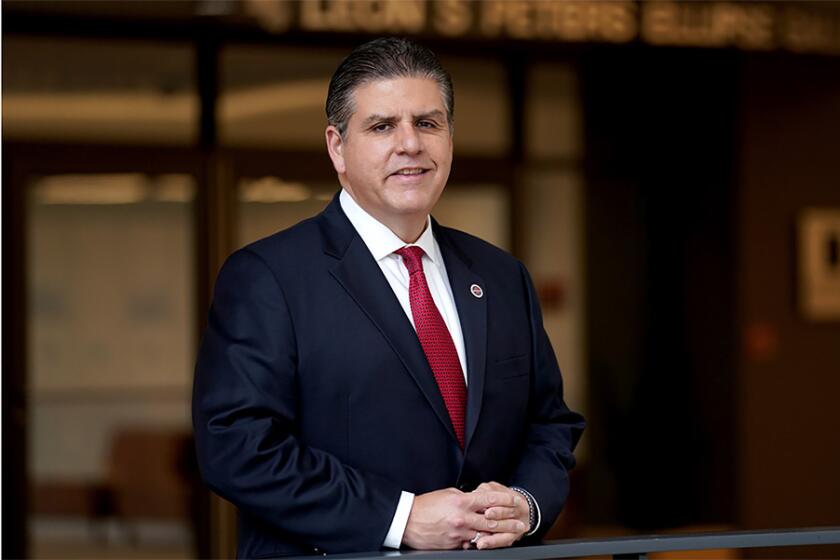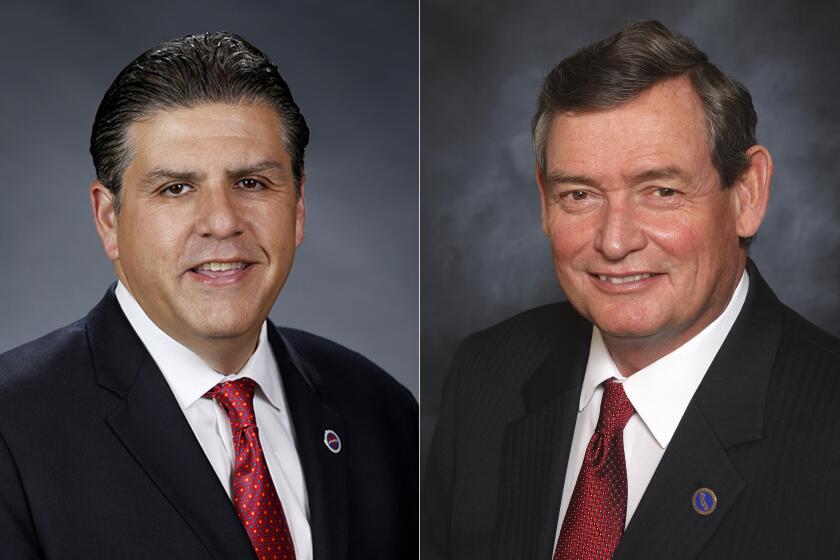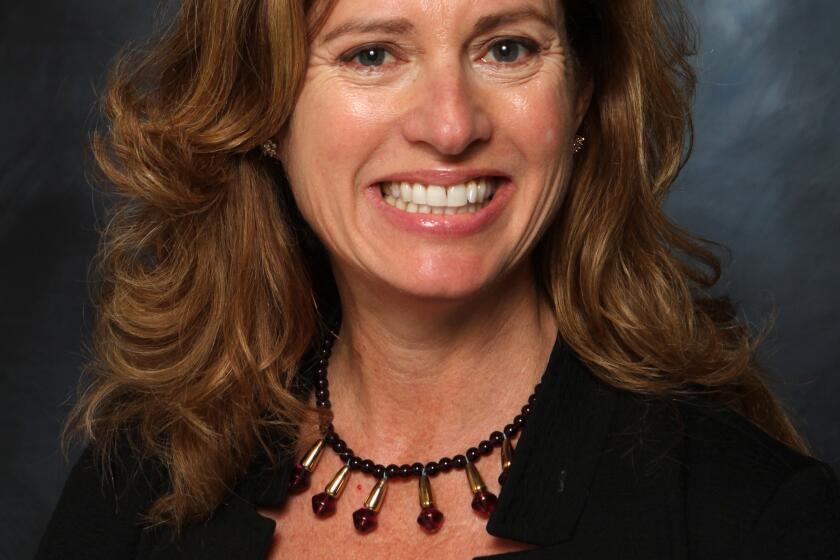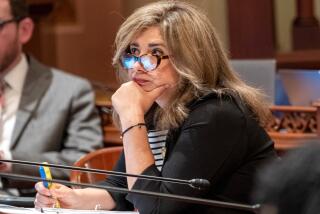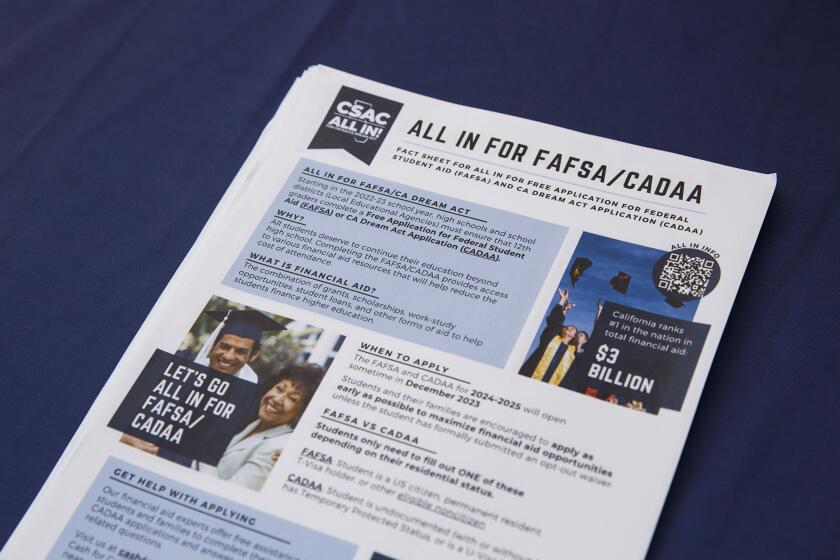CSU provost faced retaliation after reporting harassment by president’s husband, records claim

California State University paid $600,000 this year to settle a claim with a Sonoma State provost who reported retaliation and sexual harassment allegations involving the campus president and her husband, according to records in the case obtained by The Times.
Lisa Vollendorf, then the university’s provost, reported to Cal State system officials that several women alleged they were sexually harassed by Patrick McCallum, a prominent higher education lobbyist who is married to Sonoma State University President Judy Sakaki, a legal claim filed with Cal State shows.
Though not a CSU employee, McCallum is an official university volunteer who participates in campus events with his wife. Vollendorf is a longtime higher-education administrator and was recently appointed as president of SUNY Empire State College in New York.
Vollendorf said she followed system policy requiring her to report the allegations to the Cal State chancellor’s office in Long Beach, prompting retaliation from Sakaki, her boss, according to the claim, which The Times obtained with other case documents under a California Public Records Act request. The former provost accused Cal State in her claim of failing to conduct a full-fledged investigation and doing only “very cursory and preliminary interviews.”
The disclosures at Sonoma State show that the controversy surrounding how the CSU investigates and resolves sexual harassment and workforce retaliation complaints extends beyond the scandal at Fresno State, which forced the system’s chancellor to step down in February. Critics have said that senior administrators across the system have too much leeway in determining whether cases are formally investigated and settle accusations with quiet payouts to avoid negative public reaction. Following the chancellor’s resignation, which occurred weeks after Sonoma State settled with Vollendorf, CSU officials vowed to reassess Title IX procedures.
Vollendorf said she told the general counsel in December 2018 that three women — two of them campus employees — alleged McCallum talked about his sex life, ran his fingers through one woman’s hair and then made “inappropriate personal comments” about her appearance during a party at his house, according to settlement records the provost’s attorney filed with system officials. The women, who reported the accusations to Vollendorf because they worked for her or knew her, described the behavior as “creepy,” “disgusting” and “pervy,” the records said.
The former provost said she provided CSU officials with the names of all three as well as three more people who told her they witnessed the conduct, according to the records.
Chancellor Joseph I. Castro approved a quiet $260,000 payout to administrator Frank Lamas, who was accused of sexual misconduct, according to documents and officials.
Pressed for information about the case, Cal State officials acknowledged they did not launch a formal investigation into the sex harassment claims and instead spoke to Sakaki about the accusations against her husband. CSU officials said in a statement that a Title IX officer conducted a review of the allegations that involved interviewing only three people; a fourth declined to be interviewed. She concluded “the reported conduct might not rise to the level of sexual harassment as defined by university policy” if the accusations were investigated and substantiated, the statement said. The CSU’s definition of sexual harassment includes “unwelcome verbal, nonverbal or physical conduct of a sexual nature.” Officials denied Vollendorf was subjected to retaliation.
CSU officials provided brief summaries, some single sentences, from the three people contacted by the systemwide Title IX officer. One person, an apparent witness, reported seeing no misbehavior, a second person said she experienced no harassment and a third asked that McCallum “be made aware of the professionalism and discretion expected of a president’s spouse.” Cal State officials said the three people declined to proceed with a formal investigation, which would have required statements with their names.
Interviews with complainants and witnesses over several weeks reveal a more concerning picture of what occurred.
Title IX experts interviewed by The Times said it’s not uncommon for a complainant to refrain from going forward in an investigation, often due to fears of retaliation or general uncertainty. Experts said the interviewer should fully educate the complainant on the process to alleviate concerns.
In separate statements issued Wednesday, McCallum said he had done nothing wrong and Sakaki denied retaliating against Vollendorf, saying the accusations “are utterly without basis.”
“Sexual harassment, discrimination or retaliation in any form are unacceptable on our campus,” Sakaki said. “I was surprised and saddened to learn of the allegations against my spouse,” she added, saying that “he denies engaging in any inappropriate behavior.”
On Thursday, a day after this story was published online, Sakaki addressed faculty frustrations over the CSU’s handling of the case at an Academic Senate meeting. She confirmed her husband had not been interviewed by officials about the allegations and said she informed him of the claims after CSU officials spoke with her.
She did not explicitly say whether her husband will continue to attend fundraising events, but she will consider the community’s sensitivity to the allegations. When someone told her they thought her husband should apologize to the women, she thanked them for the suggestion.
The move follows a Times investigation which reported that CSU has paid more than $4 million to 11 former executives since 2015 with little accountability.
Vollendorf declined to discuss details of her allegations but provided a statement saying that leaders in higher education have an obligation to do “the right thing even when it’s the hard thing.”
“I sincerely hope that broader knowledge of stories like these results in systemic change so nobody is ever again subjected to the treatment I witnessed, reported, and experienced,” she said.
The settlement records also include information about other women who staffed events and were reassigned to avoid McCallum.
A former Sonoma State interim vice president told The Times that he changed schedules to prevent women on his team from working with McCallum during campus events. “There were complaints of inappropriate touching and comments,” said Gordon McDougall, who directed Sonoma State’s University Advancement Division, which oversees fundraising. “The women felt uncomfortable.”
Chancellor Joseph I. Castro’s resignation follows outcry over his handling of sexual misconduct and workplace harassment allegations while he was president of Fresno State.
He said that he reported the allegations to the CSU general counsel during a telephone conversation in early 2019 but that system headquarters in Long Beach never followed up with him.
The furor over how the nation’s largest four-year public university system handles similar claims led Chancellor Joseph I. Castro to resign in February amid criticism that he mishandled sexual harassment, bullying and retaliation allegations involving a senior campus official when he was president of Fresno State University. As part of a settlement in that case, the campus’ former vice president, who was accused of harassment, received $260,000 and a strong letter of recommendation from Castro.
The settlement, which was authorized by former Chancellor Timothy P. White, sparked public outrage and prompted trustees who oversee the system to order a review of how Title IX complaints are handled at each of the 23 campuses.
Cal State Board of Trustees has asked the Chancellor’s Office to investigate Fresno State’s handling of allegations under former President Castro.
The accusations at Sonoma State were made as the #MeToo movement heightened awareness about sexual assault and harassment on college campuses across the nation.
Vollendorf said that one woman told her “Mr. McCallum had ‘come onto her’ ” while she was working at a university event and that he “asked her personal and uncomfortable questions about her life and was overly and persistently flirtatious,” according to the settlement records.
The records said the same woman accused McCallum of harassing her again at another party where he “put his hands through the employees hair when he greeted her” and made “inappropriate personal comments about the employee’s appearance and also grabbed the employee by the arm so she was forced to stay close to him.”
In interviews with The Times, one of the women who reported alleged sexual harassment to Vollendorf said she was warned about McCallum by women who worked on the fundraising team.
The woman, who works on campus and asked not to be named for fear of retaliation, alleged McCallum stood inappropriately close to her for hours at one campus event. At another, she said, he used his fingers to gently brush her hair off her forehead — a type of intimate touch that she believed crossed a line.
The woman said that she spoke to a Title IX officer from the chancellor’s office and that she initially declined to file a formal complaint because she respected Sakaki and didn’t want her to be unfairly tarnished by an investigation.
As she continued speaking with the Title IX officer, the woman said, she became concerned because there were no guarantees she would be protected against retaliation if she decided to press forward with an investigation.
Afterward, the woman told The Times, she was excluded from several faculty dinners hosted by the president and her husband, which she typically would attend. She perceived that as retaliation and reported the information in late 2019 to the CSU Title IX officer assigned to the case, according to emails reviewed by The Times.
The woman told The Times that she stopped pursuing the matter after the system closed campuses amid the COVID-19 pandemic in March 2020.
Another complainant who spoke with The Times on the condition of anonymity said that during her interview with a CSU official, she discussed McCallum’s behavior, calling comments he made “creepy.” One example she shared was when he wasn’t granted a request, he said, “Does it matter if I’m sleeping with the president?”
The woman didn’t characterize the comments as harassment at the time — he hadn’t touched her, she said. She also believed she was an insignificant player and was worried for her job. She recalled being told that McCallum would have access to the transcript of the interview, which she took to mean that her comments would not remain confidential.
“He’s the president’s husband — who would say anything?” she said.
At some point, she said, McCallum’s behavior changed. He was more restrained, she said, and she suspected he had been spoken to.
McCallum, who heads the McCallum Group lobbying firm, is a longtime community college lobbyist. He previously served as executive director for the Faculty Assn. of California Community Colleges and as a consultant to the Assembly Higher Education Committee. In 2007, he founded the College and Corporate Brain Trust, a consultancy group for community colleges, universities and technical colleges.
McCallum and Sakaki made the news when they lost their Santa Rosa house in the 2017 Tubbs fire, which killed 22 people and destroyed more than 5,000 homes. In recent years, McCallum has also advocated for fellow wildfire victims.
At Sonoma State, McCallum participated in staff meetings regarding strategies to raise private donations for the university, according to McDougall, the former interim vice president who oversaw fundraising from 2018 until his retirement in 2020.
In 2019, McDougall said, he learned of accusations about McCallum from women during conversations about staffing campus events.
“I noticed there was a lot of discomfort about working with him,” McDougall said, adding that the feelings were “pretty universal” among the women on his staff.
According to McDougall, the women alleged instances of inappropriate touching and sexual comments. “I didn’t get into very deep conversations about what happened,” he said. “I was very uncomfortable.”
McDougall said he shared what the women had told him with Vice President Joyce Lopes, who oversaw sexual harassment and workforce investigations on campus. Lopes, who is no longer at Sonoma State, confirmed to The Times that McDougall spoke to her and that she told him that Sonoma State officials had been in contact with the chancellor’s office about similar claims.
McDougall said he called the chancellor’s office and later told General Counsel Andrew Jones that the women on staff had “told me about the touching and comments of a sexual nature.”
According to her claim and settlement records, Vollendorf also reported “details of the allegations” to Jones and gave him the names of the three women who had alleged being sexually harassed as well as an email from one accusing McCallum of talking about his “wonderful sex life.” She also gave Jones the names of three employees who said they witnessed inappropriate behavior.
Jones said he would ask a Title IX officer to “look into these complaints,” according to the records. Vollendorf said she voiced concern over the lack of an outside investigation, citing a 2018 incident at the University of Wisconsin-Whitewater in which the chancellor resigned amid accusations that she failed to take action after her husband was accused of sexually harassing women on campus.
In an email to Times reporters, Jones acknowledged “hearing from campus administrators about concerns they had heard from others on campus.” He said he informed then-Chancellor White and referred the matter to the systemwide Title IX officer, as required by system policy.
By not launching a formal investigation, Vollendorf alleged in her claim, “the CSU failed to follow its policies related to harassment and discrimination.”
Cal State officials said the Title IX officer is responsible for deciding whether a formal investigation should be conducted.
Title IX experts told The Times that harassment investigations are nuanced and involve many factors, including the requests of the complainants, validity of the complaints and potential damage to the accused person’s reputation.
CSU policy states that if a complainant requests that no investigation occurs, officials must weigh several factors to assess the request against a duty to safety, including whether “there is a power imbalance between the Complainant and Respondent.”
According to Vollendorf’s claim, White and CSU Deputy General Counsel Leora Freedman spoke to Sakaki in 2019 about her husband’s behavior. In their statement, system officials acknowledged that White and a system attorney met with Sakaki “so that the concerns could be addressed promptly.” Since then, no similar complaints about McCallum have been reported to the chancellor’s office or Sonoma State’s Title IX office, the statement said.
In her claim, Vollendorf alleged that the discussion prompted “a campaign of retaliation” by Sakaki. Vollendorf, who had previously received an exemplary job performance review from Sakaki, accused the president of “hostile and retaliatory behavior.”
The president made defamatory statements about Vollendorf, limited her responsibilities and refused to provide a previously agreed-upon letter of recommendation to help advance her higher education career, according to the claim.
“Throughout it all,” the claim said, “the CSU Chancellor’s Office was continuously apprised of the retaliatory behavior.”
In late October 2021, former CSU Vice Chancellor Larry Salinas told The Times, the accusations against Sakaki and her husband came up during a debriefing with Castro, the former chancellor, following a visit they had made to Sonoma State as part of a systemwide tour of campuses. Castro said that he had discussed terminating the president during a closed session of the Board of Trustees, according to Salinas. But there was pushback from some of the board members, he said.
Cal State officials acknowledged that trustees were briefed about the case in October and told of the settlement in January.
Vollendorf stepped down from her position at Sonoma State in June 2020 and for a time worked as a special assistant assigned to the chancellor’s office in Long Beach, according to records and interviews.
In January, a settlement was finalized among Vollendorf, the Cal State system and Sakaki and her husband. The agreement shows that the former provost was paid $500,000 and that her attorney received $100,000.
More to Read
Sign up for Essential California
The most important California stories and recommendations in your inbox every morning.
You may occasionally receive promotional content from the Los Angeles Times.
